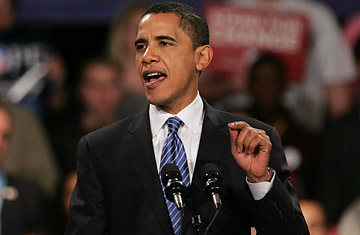
Democratic presidential hopeful Barack Obama adresses supporters during his caucus night rally at Hy-Vee Hall in Des Moines.
Barack Obama's first words after winning the Iowa caucus were intended for history and they were gorgeous: "They said this day would never come." Perhaps he was thinking small. Perhaps he was thinking about the long days in July and August and September when he trudged along the trail, well behind Hillary Clinton — who seemed a juggernaut at that point. Perhaps he was thinking back to his childhood, to the father who barely knew him and the mother who let her parents do most of the child rearing. But I suspect he was thinking bigger, back to Martin Luther King — and King's dream that someday his children would not be judged by the color of their skin, but by the content of their character.
That day has now come, at the highest level of American politics. A black man with a dangerous-sounding foreign name trounced his opponents in the nearly all-white state of Iowa. And he did so because, after spending months getting to know him, the people of Iowa stopped seeing his color and began to admire his character. In an election where the word "change" became an almost meaningless talisman, Iowa's triumph over race is a message to the world about the real nature of America — and a ratification of Obama's belief that this will be an election year where everything is on the table, where all the conventional wisdom can be tossed aside, where anything, including decency, is possible.
It was a night that was historic in ways large and small. The sheer size of the Democratic turnout — 236,000 people, nearly twice as many as 2004 — distorted the caucus process.
The second-tier candidates, who need 15% of the total at each caucus to win delegates, found themselves overwhelmed by armies — the very well run organizations of Obama, Clinton and Edwards. Forced to make second choices, the overwhelming majority chose Obama.
The size of the turnout was driven by young people, who supposedly never turn out — and by independents, and Republicans who crossed over, and by people who never had attended caucuses before but figured that this year political participation was, for once, mandatory. And a very clear message was sent: Iowa, at least, was ready for a new generation of leadership. That had been Obama's intent from the start. In my earliest conversations with him, he had expressed frustration with the perennial, divisive baby boomer political battles — "the dorm fights of the '60s," he called them — and he had a perfect foil in Hillary Clinton, whose husband had been the first baby boomer President and whose tenure, in the 1990s, had been marked by a heathen contentiousness (most of it the fault of Republican extremists, a generation of showboat demagogues.)
Iowa's decision was not only pro-Obama, but very clearly anti-Clinton — not so much anti-Hillary, whose solid, steadfast campaign earned the respect of many Iowans, but anti restoration, anti the notion of having a former two-term President elide the Constitution by returning to the White House as a spouse, anti the petty, contentious politics that seems to follow the Clintons — much to their dismay — everywhere they go. (Except, perhaps, the corridors of the Senate, which may ultimately prove to be Senator Clinton's most natural home).
Iowa's decision was about style, not substance. Obama didn't offer many new ideas and precious few that were different from his opponents'. He offered civility. At one point, Clinton tried "Turn Up The Heat" as her slogan and, throughout, John Edwards' rhetoric was so hot that it eventually burned him to a cinder. Obama's unspoken slogan was "Turn Down the Heat." The blogger Daily Kos endorsed Obama at first then, frustrated by the lack of fire, un-endorsed him. The far left wing of the Democratic Party may have to rethink the value of vitriol now.
But for me, a baby boomer slouching toward codgerization, the Obama victory was not so much about his generation — but the kids two generations behind him, the college kids and recent graduates, blissfully color-blind, who spent patient months as organizers out in the most rural counties. Obama would pay tribute to these organizers at each of his events, calling them to the stage, giving them props — and it was surprising how often the local residents in places like Algona and Mt. Pleasant would mention to me how extraordinary these kids were. They reminded me, in classic, solipsistic boomer fashion, of my own generation of the remarkable political activists who went down to Mississippi to register black voters and marched against another war, and came to politics in the Robert Kennedy and Eugene McCarthy campaigns of 1968. That generation's — my generation's — passion gave us the propulsion to quickly move to the center of political life and the media. The end of their time — our time — in the driver's seat may have begun in Iowa.
Whether or not Barack Obama goes on to win the nomination — and let's not forget in the afterglow that this is truly an open question — his field army will endure and, because of their immense skill, they will bend the political process to their will in years to come. And years from now, when they meet in the corridors of power or academia or at the inevitable reunions, they'll look at each other and smile, and they won't even have to say the words: We did something amazing back in Iowa, on January 3, 2008, didn't we?
